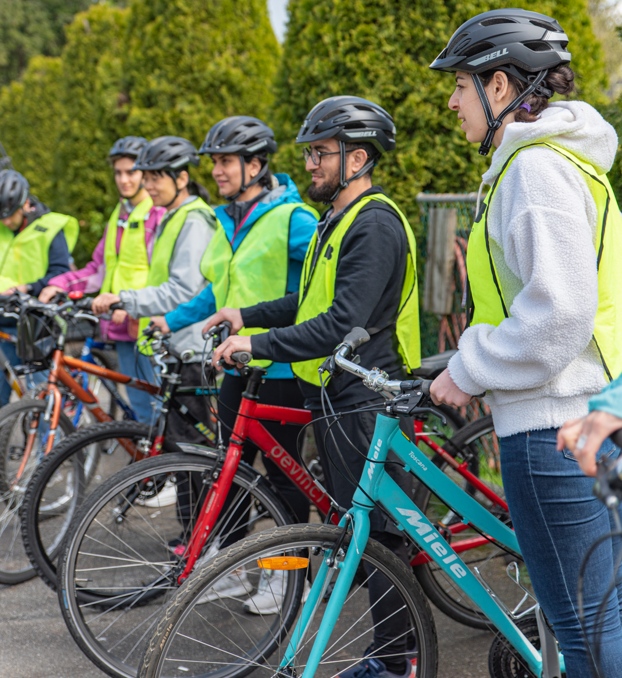Main menu
Diversity, Equity and Inclusion at HUB Cycling: Fall 2022 Update
During the second half of 2022, HUB Cycling continued our work providing low-cost or subsidized cycling education to marginalized and racialized communities, researching barriers to cycling equity in Metro Vancouver, creating marketing materials in different languages, and changing internal policies to be more inclusive.
Providing Cycling Education to Marginalized Communities
For a second consecutive year, HUB Cycling collaborated with Red Fox Healthy Living Society to deliver cycling programs for First Nations and BIPOC youth around Metro Vancouver. In August, HUB Cycling also delivered a program for the Katzie First Nation youth in Pitt Meadows. In 2022, over 100 youth participated in one of these 8-week bike skill and community mapping programs. Each youth was able to keep the bike and accessories after the program.
HUB Cycling also completed the second year of the Newcomer Bike Mentor Program (after returning from a COVID hiatus) in partnership with the Immigrant Services Society of BC, introducing cycling skills and local cycling culture to immigrants and refugees. The program had 70 newcomer participants this year, matched with 58 volunteer mentors, across 4 Spring and Summer cohorts in two program locations: Vancouver and, for the first time, the Tri-Cities.
immigrants and refugees. The program had 70 newcomer participants this year, matched with 58 volunteer mentors, across 4 Spring and Summer cohorts in two program locations: Vancouver and, for the first time, the Tri-Cities.
We expanded our in-person StreetWise courses this summer with the formation of our StreetWise Cycling Education Centre at Trout Lake Community Centre. 254 people participated in low-cost or subsidized in-person StreetWise courses. Free bike rentals were provided on-site for use during courses and additional practice sessions for people who did not own a bicycle or could not safely transport one to the course.
Researching Barriers to Cycling Equity in Metro Vancouver
In June, HUB Cycling released the “Making the Case for Cycle Highways in Metro Vancouver” report. The project looked at potential cycle highway routes in Metro Vancouver and drew on a separate equity analysis to highlight areas with high concentrations of equity-deserving groups that would benefit from improved active transportation. Ongoing work on the project includes developing a committee to work on the development of cycle highways in Metro Vancouver. This new group will include accessibility advocates and representatives from First Nation groups.
In conjunction with the Cycle Highway report, HUB Cycling examined the distribution of cycling, transit, and vehicle access around social and spatial equity measures. The upcoming report on the "Social and Spatial Equity of the Metro Vancouver Cycling Network" identifies areas that both lack good transportation access and have high concentrations of equity-deserving groups.
While municipalities throughout Metro Vancouver are making improvements for safe and complete public cycling networks and requiring excellent cycling facilities in new buildings, cycling uptake is greatly limited by the lack of high-quality end-of-trip cycling infrastructure in older buildings due to historical building bylaws and policies. HUB Cycling’s upcoming report, Cycling and Older Buildings: Exploring the Impacts of Outdated Building Design on Access to Cycling, will serve as a foundation for future work on equity and the cycling network. The Cycling and Older Buildings research report is set to be released in November 2022. This report is a project in partnership with the property management sector and government addressing barriers to cycling for people living and working in older buildings.
Creating Marketing Materials in Different Languages
During HUB Cycling's Fall Go by Bike Week, we continued creating the main event poster in different languages to appeal to more equity-deserving people who may be new to Canada and not have English as their first language. The Fall Go by Bike Week poster translated the "Go by Bike Week" tagline to French, Mandarin, Punjabi, Hindi, and Farsi. HUB Cycling also ran a targeted Facebook and Instagram ad in Punjabi during Go by Bike Week.
Changing Internal Policies to Be More Inclusive
HUB Cycling also updated our policies to enable staff to attend community events and continue their learning during National Indigenous Peoples Day and National Day for Truth and Reconciliation. In HUB’s continuing efforts to decolonize and introduce more equity and inclusion, we have updated our policies to give staff more clarity and guidance on the ability to substitute statutory holidays for other days that are more meaningful to them.
While statutory holidays are used by some for (mostly Christian) religious observances, traditions or a chance to enjoy time with family and friends, for some people, these holidays are at best irrelevant and, at worst, associated with trauma given their historical and colonial meaning. We want HUB Cycling employees to be able to have time off to celebrate holidays and traditions that are meaningful to them across all religions and beliefs. The National Day for Truth and Reconciliation is the only statutory that will be honored as a paid day off that cannot be substituted.
If you have any feedback on how we can continue improving our diversity, equity, and inclusion efforts, please contact us at diversity@bikehub.ca. You can continue following our journey on our diversity, equity & inclusion page.
